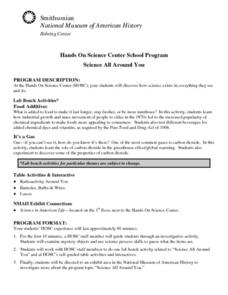Baylor College
Food Webs
Explore various ecosystems from around the world as your class discovers the interdependence of all living things. Using the provided sets of ecosystem cards, young scientists work in small groups building food webs to demonstrate the...
University of Waikato
Build a Marine Food Web
Dive into a lesson on marine ecosystem interactions. Individuals learn about and devise a marine food web. The resource provides organism cards and pupils use article resources to discover interactions before modeling them in a food web.
Purdue University
Mammal Food Webs
You are what you eat—or at least a part of what you eat. Budding scientists examine owl pellets to develop their own food webs. They use tooth and skull identification techniques to classify what they find.
Baylor College
Plant Parts You Eat
Plants provide a variety of delicious foods essential for human survival. In the fourth lesson of this series on food science, young scientists investigate common fruits, vegetables, and grains in order to determine which plant part is...
Baylor College
Serving Sizes
Are serving sizes for different foods always appropriate for what you need? In this hands-on activity, learners work in groups to estimate what one serving size of various foods are, and then evaluate their hypotheses by measuring real...
NOAA
Seafood and Human Health
Whether your young biologists realize it or not, humans play a significant role in marine ecosystems. To help them understand this fact children first create graphical representations that show homo sapiens' place in marine food chains,...
Curated OER
Food Safety
Students recognize that safe food preparation is important to good health. In this food safety lesson, students participate in an activity students separate, clean, chill, and cook food safely. Students use Glo Germ to find where germs...
Curated OER
Fun With Food Chains
Students explore our ecosystem by researching animal eating habits. In this food chain lesson, students identify the links between predator and prey and the energy that passes between organisms based on what their diet consists of....
Curated OER
My Colorful Food Chain
Students explore biology by participating in a dietary habit activity. In this food chain lesson, students discuss their own diets and the animals we feed upon daily. Students create a poster demonstrating the animals that we feed upon...
National Park Service
Living & Non-Living Interactions
What better way to learn about ecosystems than by getting outside and observing them first hand? Accompanying a field trip to a local park or outdoor space, this series of collaborative activities engages children in learning about the...
Baylor College
Do Plants Need Light?
Turn your classroom into a greenhouse with a lesson on plant growth. First, investigate the different parts of seeds, identifying the seed coat, cotyledon, and embryo. Then plant the seeds and watch them grow! Measure the new plants...
Curated OER
Food Web
Learners use a software program to create a food web. Using the web, they identify the path of energy using arrows and label organisms as either producers or consumers. They show and explain their food web to the class.
Curated OER
Circle of Life
Learners consider why we eat and where our food obtains its energy. They illustrate food chains that might be found on an open field, dissect owl pellets, identify the remains of animals in the pellets, watch videos and participate in...
Curated OER
Skulls Tell It All
Skulls tell it all, and with this lesson plan, you will tell it all to your class! Youngsters view animal skulls, analyzing the shape of teeth and the placement of the eye sockets. They associate these adaptations with the types of food...
Curated OER
Science All Around You
Students visit and explore a Hands On Science Center (HOSC). They participate in a variety of self-guided table exercises and observe as scientists demonstrate various scientific principles.
Curated OER
The Web Of Life - Overlapping Food Chains
Young scholars perform an activity in which they discover what happens when food chains overlap in an ecosystem and discover the three components of a food web.
Curated OER
Venus Flytrap
Students study the Venus Flytrap including its habitat and how it eats. In this ecology lesson students complete several experiments using a Venus Flytrap to see how it reacts to various conditions.
Curated OER
What Do Snails Eat?
Young scholars conduct a food choice experiment with snails, recording the results on a chart to determine what snails eat. In this what do snails eat lesson plan, students color a picture of snail anatomy, perform the experiment with 3...
Curated OER
My Farm Web
Third graders explore agriculture by viewing video clips in class. In this farm animal lesson, 3rd graders identify the animals mostly eaten that come from farms and the types of food they consume before they are eaten by us. Students...
Curated OER
The Chain Gang
Students perform a food chain simulation to determine what happens when a food chain is broken.
Curated OER
What's For Dinner?
Students explore the food chain. They brainstorm and create a consumer-consumed food chains using magazine pictures and research materials. Students identify consumer-consumed relationships.
Curated OER
Collecting Compost
Students observe a composting box. In this soil lesson plan, students create a composting bin by using a bin, newspaper, worms, and food scraps. Students create a composting food web.
Curated OER
Let's Start Growing
Learners investigate how a tree grows from a seed. In this plant biology lesson, students use potting soil, tree seeds, and a paper cup to observe seeds growing into plants. Learners record observations in their science journals.
Curated OER
Bias Sampling
Students explore statistics by conducting a scientific study. In this data analysis lesson, students conduct a class poll about popular foods of their classmates. Students complete a worksheet and discuss how bias opinions affect the...

























